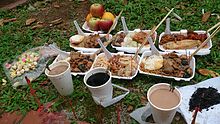
Back شبح جائع Arabic ভোকাতুৰ ভূত Assamese Hungergeist German Nesatigebla Fantomo Esperanto Hantu Lapar ID Memedi luwe JV ഹഗ്രി ഗോസ്റ്റ് Malayalam Hantu Lapar Malay Sultne spøkelser NB பசியுள்ள பேய் Tamil
 7th month Hungry Ghost Festival offerings in Singapore. | |
| Grouping | Legendary creature |
|---|---|
| Sub grouping | Nocturnal, revenant |
| Similar entities | Krasue and Kalag |
| Folklore | Chinese Buddhism, Chinese traditional religion |
| Country | China |
| Region | East Asia, South Asia, Southeast Asia |
| Part of a series on |
| Chinese folk religion |
|---|
 |
Hungry ghost is a term in Buddhism, and Chinese traditional religion, representing beings who are driven by intense emotional needs in an animalistic way. The terms 餓鬼 èguǐ literally "hungry ghost", are the Chinese translation of the Sanskrit term preta[1] in Buddhism. "Hungry ghosts" play a role in Chinese Buddhism,Taoism, and in Chinese folk religion. The term is not to be confused with the generic term for "ghost" or damnation, 鬼 guǐ (i.e. the residual spirit of a deceased ancestor). The understanding is that people first become a regular ghost when they die[2] and then slowly weaken and eventually die a second time.[3][4] The hungry ghosts, along with animals and hell beings, consists of the three realms of existence no one desires.[5] [6] In these realms it is extremely difficult to be reborn in a better realm (i.e. the realm of humans, asura or deva) because it is nearly impossible to perform deeds that cultivate good karma.[7]
With the rise in popularity of Buddhism, the idea that souls would live in space until reincarnation became popular .[4] In the Taoist tradition, it is believed that hungry ghosts can arise from people whose deaths have been violent or unhappy. Both Buddhism[4] and Taoism[8] share the idea that hungry ghosts can emerge from neglect or desertion of ancestors. According to the Hua-yen Sutra evil deeds will cause a soul to be reborn in one of six different realms.[9] The highest degree of evil deed will cause a soul to be reborn as a denizen of hell, a lower degree of evil will cause a soul to be reborn as an animal, and the lowest degree will cause a soul to be reborn as a hungry ghost.[10] According to the tradition, evil deeds that lead to becoming a hungry ghost are killing, stealing and sexual misconduct. Desire, greed, anger and ignorance are all factors in causing a soul to be reborn as a hungry ghost because they are motives for people to perform evil deeds.[2]
Some traditions imagine hungry ghosts living inside the bowels of earth or they live in the midst of humans but go unnoticed by those around them or they choose to distance themselves.[11]
- ^ Rotman, Andy (2021): Hungry Ghosts. Somerville: Wisdom Publications. P. 16.
- ^ a b Venerable Yin-shun. The Way to Buddhahood. Massachusetts: Wisdom Publications: 1998.
- ^ "目次:冥報記白話". www.bfnn.org.
- ^ a b c Eberhard, Stephen F. The Ghost Festival in Medieval China. New Jersey: Princeton University Press: 1988. Hungry ghosts, by contrast, are a much more exceptional case, and would only occur in very unfortunate circumstances, such as if a whole family were killed or when a family no longer venerated their ancestors.
- ^ Avadānaśataka 244. 14.
- ^ Roth (2021): p. 16.
- ^ Jones, J. J. 1949–56. Thee Mahāvastu. 3 vols. London: Luzac and Company. pp. 22—24.
- ^ Oldstone-Moore, Jennifer. Taoism. USA: Oxford University Press: 2003.
- ^ Baroni, Helen J. Ph.D. The Illustrated Encyclopedia of Zen Buddhism. New York: The Rosen Publishing Group, Incorporated: 2002.
- ^ Gregory, Peter N., ed. Inquiry Into the Origin of Humanity. Hawaii: University of Hawaii Press: 1995.
- ^ Stuart, Daniel Malinowski. 2012. “A Less Traveled Path: Meditation and Textual Practice in the Saddharmasmṛtyupasthāna(sūtra).” PhD dissertation, University of California–Berkeley. P. 50.
© MMXXIII Rich X Search. We shall prevail. All rights reserved. Rich X Search
